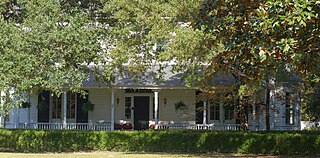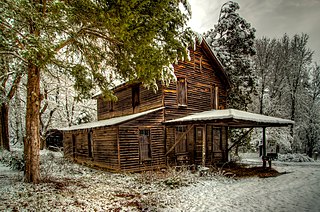
The North Carolina State Capitol is the former seat of the legislature of the U.S. state of North Carolina which housed all of the state's government until 1888. The Supreme Court and State Library moved into a separate building in 1888, and the General Assembly moved into the State Legislative Building in 1963. Today, the governor and his immediate staff occupy offices on the first floor of the Capitol.

The Carolina Inn is a hotel listed on the National Register of Historic Places on the campus of the University of North Carolina at Chapel Hill in Orange County, North Carolina, which opened in 1924. The Carolina Inn is a member of Historic Hotels of America, the official program of the National Trust for Historic Preservation.

Pocahontas Fuel Company Store and Office Buildings are a historic company store and an office building located at Jenkinjones, McDowell County, West Virginia. Both buildings were designed by architect Alex B. Mahood and built in 1917. They were listed on the National Register of Historic Places in 1992.

The Mesker Brothers Iron Works and George L. Mesker & Co. were competing manufacturers and designers of ornamental sheet-metal facades and cast iron storefront components from the 1880s through the mid-twentieth century. The Mesker Brothers Iron Works was based in St. Louis, Missouri, and was operated by brothers Bernard and Frank Mesker. The George L. Mesker Company was operated by a third brother, George L. Mesker, and was based in Evansville, Indiana. The Mesker brothers were the sons of John Mesker who operated a stove business in Evansville and later galvanized iron for buildings. The three brothers learned their iron-working skills from their father.

The H. A. McKim Building is a historic building located at the southwest corner of Main and Oddie Streets in Tonopah, Nevada. The building was constructed in 1906 for Hiram Albert McKim, who had begun a mercantile business in the town two years prior. Carpenter craftsman J. J. Finley and stonemason E. E. Burdick constructed the building, a two-story stone building designed in the Classical Revival style. The building's design includes an ashlar front facade, a pediment at its parapet, second-story windows ornamented with voussoirs and keystones, and a metal cornice. McKim's store ultimately became the largest mercantile store in central Nevada.

E. W. Cannon House and Store is a historic home and general store located at Hartsville, Darlington County, South Carolina. The main house was built about 1880 and incorporates a small one-story residence built about 1840 that now serves as a rear wing. It is a two-story, rectangular, frame residence with weatherboard siding. It features a one-story hip roof porch that extends across the full façade. The store was built about 1870 and is located to the rear of the house. It is a 1+1⁄2-story, rectangular, hand-hewn heavy timber-frame building that served as a post office from 1873 to 1878. Also on the property are a contributing frame garage and a frame smokehouse. The house and store were built by Elihu W. Cannon (1841-1911), prominent Hartsville farmer, postmaster, and Darlington County politician.

Monticello Store and Post Office is a historic general store and post office located at Monticello, Fairfield County, South Carolina, United States. It may have been built as early as 1820, and is a one-story, frame, weatherboarded, T-shaped building. The front façade features an undercut gallery with a pedimented gable supported by octagonal wooden columns. The building was used as a store and post office after the American Civil War until the mid-1960s.

Hester Store is a historic general store located at Dacusville, Pickens County, South Carolina. It was built in 1893, and is a two-story, front-gable, weatherboard-clad building with an ashlar granite front facade. It features a full-width, single story, porch with granite pillars. The granite facade and porch were added in 1933.

J.A. Byrd Mercantile Store, also known as Nelson-Frazier Furniture, is a historic commercial building located at Eastover, Richland County, South Carolina. It was built about 1910, and is a two-story, three-bay, brick building. The front façade is faced with blond brick, marble, and cast stone. The first-floor has a three-bay arcade and the second story has three tall arched windows.

Efird's Department Store, also known as Lourie's Department Store, is a historic department store building located at Columbia, South Carolina. It was built about 1870, and is a rectangular brick building renovated and expanded in 1919. This included the addition of a third story and the installation of a new brick façade and store entrances. Between 1919 and 1958, it housed the Columbia branch of the Charlotte, North Carolina based Efird's Department Store chain. It currently houses a Mast General Store, which moved in on May 25, 2011.

Efird Building is a historic commercial building located at Burlington, Alamance County, North Carolina. It was built in 1919, and is a three-story, Gothic Revival style building. The front facade is sheathed in white enamelled terra cotta tile. It housed a branch of Efird's Department Store based in Albemarle, North Carolina.
Brown–Graves House and Brown's Store is a historic plantation complex located near Locust Hill, Caswell County, North Carolina. The plantation house was built about 1800, and is a two-story, five-bay, Late Georgian style frame dwelling. It is set on a stone basement and has a low hipped roof. The front facade features a one-story pedimented porch with Corinthian order columns. Brown's Store is located across from the house and is a one-story, gabled frame building with a single shouldered stone and brick chimney. Also on the property are the contributing two slave quarters, a smoke house, and a Greek Revival period law office.

Warren House and Warren's Store is a historic house and store and national historic district located at Prospect Hill, Caswell County, North Carolina. The house was built about 1858, and is a two-story, three-bay, Greek Revival style frame dwelling. It is set on a brick foundation and has a low hipped roof. The front facade features a two-story, three-bay, pedimented porch. Warren's Store and Post Office is located across from the house and is a two-story rectangular brick building of vernacular Greek Revival temple-form design. Also on the property is the contributing kitchen building.

Liberty Row is a national historic district located at Fayetteville, Cumberland County, North Carolina. It encompasses 14 contributing buildings and 1 contributing site in the central business district of Fayetteville. The district includes consists of a block of 14 brick row buildings dating between 1791 and 1916. The Liberty Point Store is the oldest structure and is a two-story, five-bay, Federal-style brick building. The brickwork of the Liberty Point Store and several other original facades are laid in Flemish bond while others are laid in common bond.

Cana Store and Post Office is a historic general store and post office building located near Mocksville, Davie County, North Carolina. It was built about 1875, and is a two-story, three-bay, frame building with a gable roof. The front facade features a broad hip-roofed frame canopy added in the 1930s that serves as a porte-cochere. Also on the property is a contributing one-story woodshed built in the 1930s. The building housed a post office until 1954 and a general store until 1965.

The former Sanford High School, also known as West Sanford Middle School, is a historic high school building located at Sanford, Lee County, North Carolina. It was designed by the firm of Wilson, Berryman & Kennedy and built in 1924–1925. It is a two-story, L-shaped, Classical Revival-style brick building. The front facade features a slightly projecting center pavilion and terminal pavilions with concrete-faced pilasters with enriched capitals. The building houses the Lee County Art and Community Center.

Rev. Joshua D. Jones House is a historic home located at Mill Spring, Polk County, North Carolina. It was built in 1897, and is a two-story, three-bay, frame I-house with a two-story rear ell. A kitchen addition was built in 1925. It features a shed-roofed porch covering three-fourths of the lower facade. Also on the property is the contributing one-room, frame store building and well. It was the home of African-American community leader Rev. Joshua D. Jones of the Stony Knoll community.

The former United States Post Office is a historic post office building located at Mount Olive, Wayne County, North Carolina. It was designed by the Office of the Supervising Architect under James A. Wetmore and built in 1931–1933. It is a two-story, seven-bay, T-shaped, brick building in the Classical Revival style. The central five bays of the front facade features a colonnade of six unfluted Roman Ionic order columns in antis. The building has been converted to office space.

Davis Brothers Store is a historic general store located at East Bend, Yadkin County, North Carolina. It was built in 1913, and is a two-story brick commercial building. The front facade features intact store fronts and entrances and a one-story shed-roofed canopy-like porch. Also on the property is a contributing center-passage frame storage barn dated to the 1930s.

The Saltus Grocery Store is a historic mixed-use commercial and residential building at 299-301 North Winooski Street in Burlington, Vermont. Built in 1897, it is a well-preserved example of a neighborhood store of the period. It was listed on the National Register of Historic Places in 2001.























